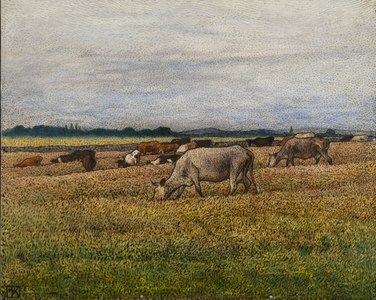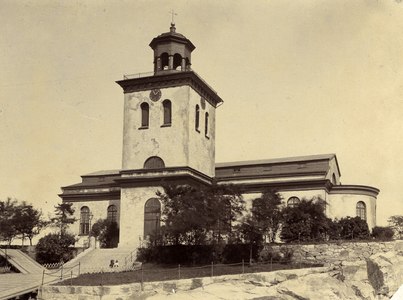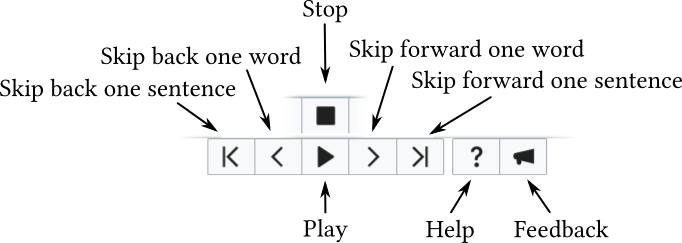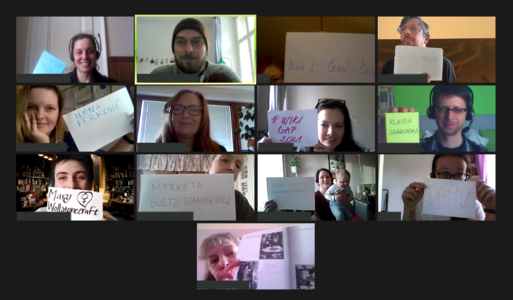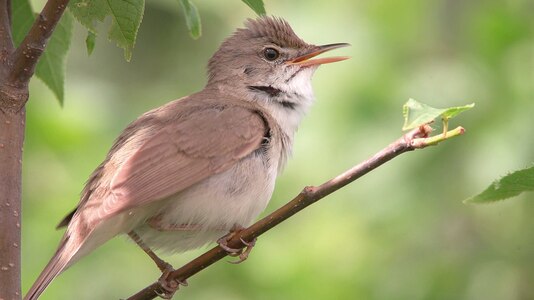Annual Report 2021
Introduction
As the pandemic continues we have in many ways been forward-looking and we continued our preparations for the future.
The four programmatic areas developed in 2016 – Access, Use, Community and Enabling – have continued to form the base of the project structure. A breakdown of the goals we have achieved within each of them can be found here. This year has in many ways been a time of stabilization, continuation and finalization of the long-term efforts we have worked on during many years. Some major trends so far this year are that:
- We thought and planned for the future
- As the chapter's current 4-year strategy came to its end in 2021 we formed a number of working groups to build consensus about the strategy for the next 4 years. The strategy was unanimously approved by the Annual General Assembly and the organization has a clear path forward until 2025.
- We refocused our hub plans based on the changing opportunities and are in the process of adjusting the ideas we worked on in 2020 to fit the new 4-year strategy. We will refocus our efforts with a more limited focus on software development as we, in the current environment, see fewer opportunities for us to contribute efficiently. Instead we will pivot and work to develop our capabilities around international partnerships, investigate the needs around content partnerships from Wikimedia affiliates and GLAM-Wiki volunteers, support affiliates with technical support, e.g. batch uploads, and capacity building etc. We will, however, provide limited development support for a selected few strategic tools that are of high value for content partnerships.
- The WikiGap campaign has been organized successfully since 2018. We have seen it expand and refocus due to the pandemic, and many great ideas have been developed by the communities across the world. We are constantly thinking about how we can further refine the WikiGap campaign and as we are approached by a myriad of organizations that are interested in contributing to these efforts we are planning to expand and experiment even more in 2022. We successfully applied for an external grant to experiment and scale up and to form interesting new partnerships. We are also aiming to combine the strength of WikiGap with the content donations we are working on as part of the thematic hub we hope to form.
- Preparatory work has been done to allow for an expansion of the volunteer engagement with the development of a long term plan and new training material. We are in the process of applying for a major grant to hopefully scale this work with a dedicated team in 2022–2024.
- We are finally launching some of our key initiatives
- Wikispeech has been under development since 2015 and in June 2021 we finalized the software so that we could launch Wikispeech on Swedish Wikipedia. That marked the start of a period of feedback and refinement which will allow us to continue scaling, and hopefully present a stronger case for the Wikimedia Foundation to integrate the tool as a MediaWiki extension.
- Our plans for a future thematic hub around content partnerships in Sweden have been developing since 2019. However, our intentions and plans with the hub have not been possible to communicate in the way we would have preferred because of a number of ambiguities and uncertainties. When we now – finally – have funding secured until mid-2023, and we know that any future funding will be through the soon-to-be-established Global Council we can actively start communicating in a more direct way and investigate what needs and interest Wikimedia affiliates across the world have.
- In 2020 we started experimenting more seriously with a national fundraising initiative. We have analyzed and processed the results from the early experiment. The plans we had to scale up the work in late 2021 had to be put on hold because of the pandemic taking a turn for the worse.
Major financial developments
One of the major changes this year from our expectations was the continued uncertainty and unclarity about long-term funding for the thematic hub work. The promises around significant multi-year funding that we were given in the beginning of the year were not fulfilled. Instead, a large single grant was provided in June 2021. This allowed us to continue to prepare for the hub in 2021 and we will hopefully keep this momentum up until a structure for the funding is established in late 2022 or 2023.
We continued to work on increasing national fundraising in Sweden. Even though the majority of our work was about preparing for larger initiatives post-COVID, we did increase the donations by nearly 50%. Furthermore, in 2021 we received our first legacy gift. This was a significant gift of around 400,000 USD in stocks and cash.
The overall spending this year was reduced compared to both the projected costs in the APG application as well as the finalized 2020 costs. The reduction was in large part caused by reduced staff costs as multiple staff members have had periods of parental leave or leave of absence etc. combined with the fact that we had a somewhat increased staff size in 2020 as we were preparing for launching the thematic hub.
The funding secured during this year, and the first months of 2022, will last until November 2024 at our current costs. However, that includes our reserves and we will still need to actively work to raise funds in 2022 to keep the organization stable long-term. Whilst the fundraising efforts can not slow down, it does allow us to be more strategic and long-term with our fundraising.
Overall, the financial security that was reached during the year has helped to reduce uncertainty and stress for the organization and allows us to think longer and more strategically.
Access
Our Access program focuses on improving the free content on, or available to, the Wikimedia projects in both the short and long term. This continues to be our largest program, considering both the number of ongoing projects and initiatives, and the budget. During the year preparations to further scale this program in 2022 and onwards took place. However, it is worth noting that some larger projects in this program also contribute significantly to other programs in the organization. For example, a lot of work around the development of the organization happens as an integrated part of the program – e.g. in the Tools for partnerships project we worked to develop our fundraising capacities.
We are very aware that the needs in many parts of the world are very different from the Swedish context; e.g. in some countries, cutting-edge data processing technology might not be the top priority for GLAM institutions and other potential content partners. We knew that we needed to deepen our understanding of the different needs across the Wikimedia movement to be able to provide support the best way possible. Therefore we started a series of interviews and conversations to investigate what type of hands-on support would be most needed. The insights gathered from this work influenced our planing and experimentation around the Thematic hub for content partnerships we are working to establish.
We have over the years built strong practices around expert engagement, partnerships and technical support and we have successfully continued to build upon them this year. We are now hoping to find ways to support the global community with hands-on help around content partnerships. The importance of not just receiving financial support, but expertise, technical support and more was highlighted numerous times in the Wikimedia 2030 strategic process. To that end we started the work to organize a helpdesk, where support will be provided to affiliates and volunteers struggling with a content partnership. We also supported the technical development and maintenance of three key software tools that are of strategic importance for the Wikimedia community’s work with content partners.
We also hope to use our experience to form new content partnerships with intergovernmental organizations (IGOs) and international non-governmental organizations (INGOs) and to coordinate the work in this area. We also see new exciting opportunities around structured data and will work on developing our skills around both Wikibase and Structured data on Commons.
Wikimedia Sverige is in this for the long run. We aim to change the way organizations and society think about knowledge dissemination and production. Creating that kind of change in attitudes will allow for the full impact of free knowledge. By convincing decision makers to adopt different forms of policies around openness we are laying the foundations for accessing new material in the future.
Deep dive
Story: Crowdsourcing names in WikiGap: In this Story we are focusing on the crowdsourcing campaign organized as part of WikiGap in 2021. Several partners took part in attempts to get examples of women missing from Wikipedia. So far, a few thousand names have been proposed.… Click here to read more.
Story: Connecting Wikidata to the GLAM institutions' databases: In this Story we share our experience from assisting GLAMs in developing a long-term strategy to include Wikidata as a natural part of their data ecosystems. We have been providing them with the skills and tools they need to independently work to utilize Wikidata as a central tool for authority data and connect their different collections.… Click here to read more.
Story: Investigating what the Wikimedia movement is wishing for regarding partnerships: In this Story we focus on the work done to investigate how the Wikimedia affiliates are working with content partners, what they want to do more of, where their issues are and what they would like to support with, or coordinate around. Content partnerships is an area where many affiliates have experiences and see a need for more exchange and to co-develop a common vision.… Click here to read more.
Story: A structured effort on Structured Data on Commons: In this Story, we give an overview of our large-scale work with Structured Data on Commons, which included data uploads, outreach and documentation.… Click here to read more.
Story: Continuing the work to document the world's cultural heritage sites and GLAM institutions: In this Story we give an overview of the renewed efforts we are doing with cultural heritage data on the Wikimedia platforms. This strategic and long-term work will help to develop a knowledge base that will be valuable for future content partnerships and renew the interest to work with the Wikimedia movement from existing content partners.… Click here to read more.
Story: Developing a Helpdesk for the movement's content partnerships: In this Story we are focusing on how we have laid the foundation of a new type of service for the Wikimedia movement, a helpdesk. We have worked hard to make sure that the helpdesk we are developing cater to the needs of the movement, gives support do a diverse set of actors, and makes sure that the support given is useful on the platforms.… Click here to read more.
Story: Opening up the UN to the Wikimedia movement: In this Story we are focusing on our work to push the agencies of the United Nations (UN) towards more free content, and in turn, how to make best use of this content on the Wikimedia platforms together with global Wikimedia communities.… Click here to read more.
Story: Coordinating around the Copyright Directive: In this Story we are focusing on how we used the implementation process of the EU Copyright Directive to establish networks with important partners, connect our national and international advocacy efforts, and push for more exceptions and limitations to the copyright regime.… Click here to read more.
Story: Highlighting Open Educational Resources in Sweden: In this Story we are focusing on how the field of Open Educational Resources can be expanded in Sweden. Through a network, a conference and a response to a governmental report, we aim to reach decision makers in academia and cultural heritage, as well as on the governmental level.… Click here to read more.
-
During a workshop with the Swedish Performing Arts Agency, an article was written about the first fiddler competition in Sweden in 1906. A few weeks later, a nice suitable photo on a local history page was found, and they agreed to share high-resolution versions of the photo to add to the article.
-
As part of Content partnerships support, we experimented with several uploads. In this case, the publication Fataburen, the yearbook of the Nordic Museum. This upload made Fataburen, which is of large cultural historical interest, much more accessible online. The photo shows a pair of traditional gloves from Värmland County in western Sweden.
-
In order to make the files on Wikimedia Commons more easily accessible, easier to find and more advanced and exact queries are possible, Wikimedia Sverige has worked with large scale improvements of Structured Data on Commons. This map shows the location of creation of photos uploaded by the chapter from the UNESCO Archives.
-
2021 images from four museums in Göteborg were uploaded to celebrate the city's 400 year anniversary, including many highlights from the art museum – here Landscape with Cows by Nils Kreuger. We provided the museum staff with thorough training about the Wikimedia projects so that they could select the images and prepare the metadata themselves.
-
The upload included many historical photos of Göteborg, like this one of the Carl Johan Church. They were particularly appreciated by the very active group of Göteborg Wikipedians and quickly found their way to articles on our city's history and architecture.
-
In the project Wikidata for authority control, Nationalmuseum experimented with visualizing the data about their artists on Wikidata. One of the visualizations makes it clear how the artists moved around the world.
-
Working directly with schools and students is always a highlight of our educational programs. Here, some high school students are doing research at the Nordic Museum's library, preparing their capstone projects – Wikipedia articles on various cultural history topics.
Use
The focus of the program is to make the platforms and activities known, appreciated and trusted. It also includes our work to make the platforms easy to use and both our platforms and activities accessible to everyone.
Making the platforms and activities known and appreciated
Previously, with more limited resources invested, we mainly targeted different expert groups and similar in our communication, for example posting in Facebook groups for GLAM professionals. In 2021 we invested resources in developing our social media presence so that our activities and messaging can reach a significantly larger audience. This was part of our preparations for an increased focus on fundraising in 2022.
We believe that more communication will, amongst other things, improve our possibilities for increasing participation at our events, help us find more partners, increase funding opportunities and prevent misunderstandings about our work and the Wikimedia platforms.
We have also worked on ensuring that our activities are noticed and highlighted by the media by issuing press releases and providing expert support to journalists.
Our goal of reaching 5,000 members in 3 years is dependent on developing clearer communication that highlights the value of the work we do.
Making usage easy and accessible to everyone
Through our efforts we hope to make the platforms easier to use for our readers. We focus both on our in-house development, mainly through the ambitious Wikispeech project, and on informing other developer teams about issues that we encounter during workshops and other events that we organize.
Deep dive
Story: Usage of MediaWiki amongst Swedish authorities: In this Story we are focusing on the inventory we made on how Swedish authorities use MediaWiki. It turned out that several authorities either used, had used, or were interested in using MediaWiki for their internal work.… Click here to read more.
Story: Wikispeech is activated!: In this Story we are focusing on how we, after 5 years of development, finally were able to launch Wikispeech on Swedish Wikipedia. By doing so we have increased accessibility of the content for people who, for different reasons, have a hard time reading. It was not a straight path at all and the initiative was close to fall apart at the very end.… Click here to read more.
-
Wikispeech has become a gadget on Swedish language Wikipedia. Logged-in users can activate it in their settings, and start listening to the articles in Swedish. The menu is shown at the bottom of the page.
-
And the menu works as follows.
-
Slides from the workshop about the Wikimedia APIs, which was part of our collaboration with the genealogy startup Trackuback – but also open to everyone with an interest in developing Wikimedia-connected apps.
-
The online workshop (in Swedish) was recorded, so no worries if you missed it!
Community
Supporting existing community
We work to support the volunteer community in a number of ways, which is possible thanks to staff members with a wide variety of skills and because of the infrastructure we have built up in the last few years.
We see the Wikimedia movement needing two different sets of volunteers, that to some degree overlap: 1. the online contributors who, for example, edit Wikipedia, photograph for Wikimedia Commons or add data to Wikidata, and 2. the volunteers who are interested in supporting free knowledge offline in different ways, such as organizing events, giving lectures, soliciting new members or forming new partnerships. We have historically focused on the first group, but now we are aiming to create resources needed to grow the second group.
This year we have therefore focused on building a stronger foundation by developing communication tools, a strategy and training material.
We still continue to create meeting spaces and cover the costs associated with volunteer work. We have also provided technical support to create tools (requested solutions for long-standing technical problems) for the most active volunteers.
The work to support the volunteer community with requested technical solutions has shifted focus to maintenance of previously developed tools due to competing priorities from externally funded projects coupled with a smaller developer staff than expected during the year.
Due to COVID-19, these efforts have however been hampered as the volunteer community has not been able organize events – for example the yearly Wikimedia camps we have organized had to be canceled. Still, other parts have been possible to move online, at least partly, e.g. the regular edit-a-thons hosted by some of the volunteers.
Deep dive
Story: Verifying Wikipedia – with the help of Mediearkivet: In this story we focus on the work done by editors to verify and add high quality sources to articles using the digital news archive Mediearkivet as a resource.… Click here to read more.
Story: Starting to support volunteer software developers: In this Story we outline the first steps taken on the path to creating a qualitative support structure for the volunteer developers in the Wikimedia movement to ensure that they thrive and that long-term maintenance of key software is ensured over time.… Click here to read more.
Fail fest: An extra AGM adds complexity: In this Fail fest we are focusing on the extra Annual General Meeting (AGM) we held in May 2021, and what led us to the extraordinary decision to have two, and not one, AGM during the same spring.… Click here to read more.
Expanding the community
To grow the community on the Wikimedia platforms, we are organizing a number of activities aimed at creating interest among groups of people who have yet to engage on our platforms, or around free knowledge in general.
We work to raise awareness of the Wikimedia projects in order for new participants to engage. When new participants start to contribute, we make sure to lower barriers and create an inclusive environment and to provide direct support in different forms.
Our cooperation with different organizations has been a cornerstone in achieving success in community growth. By involving the communities of our partners in our projects, some of their community members have joined the Wikimedia community in some capacity.
Both the WikiGap initiative and the Wiki Loves Earth and Wiki Loves Monuments contests have continued to be strong vehicles for engagement from new volunteers and we will continue to develop these concepts further.
Deep dive
Story: Trio of ambassadors in WikiGap: In this Story we are focusing on the first attempt ever to kick off the WikiGap Campaign with a global WikiGap event. With almost 70 participants, and more than 200 content pages created or improved, the event, which was opened by speeches from three Swedish women diplomats, was one of the most successful WikiGap events we have organized so far.… Click here to read more.
-
WikiGap was organized in 2021 as well. The pandemic forced many of the events to become virtual – but that worked well, too.
-
In some cases, however, communities were able to organize physical events. We long for the day when events can become physical as standard again!
-
Sweden participated in Wiki Loves Earth this year as well. Close to 2,000 photos were uploaded, many of them of high value for the Wikimedia platforms. Here is an aerial photo over the island of Ven, in the sea between Sweden and Denmark, one of the results of the campaign.
-
Macro was introduced as one of two categories in the international Wiki Loves Earth campaign. Several macro photos were contributed by participants, such as this closeup of a Blyth's reed warbler, a relatively common visitor to Sweden.
-
Wiki Loves Monuments was, as always, full of amazing pictures, with almost 2,000 entries submitted. This photo of Kungsstenarna, an Iron Age gravesite on Öland, won this year's edition.
-
The project Community support focuses on empowering Wikimedians who do great things and providing them with practical and financial support. One of the projects is a weekly podcast about Wikipedia, Wikipediapodden (in Swedish). Over 170 episodes have been published so far.
Enabling
The chapter aims to be a relevant actor for years to come and is actively working towards building the organizational capacity needed for long term activities and commitments. We need to be a good employer, a strong partner, and a well functioning democratic and transparent membership organization with close cooperation with a strong volunteer community. The chapter is also intending to not be an isolated player but be actively involved in the international movement.
These intentions demand projects that are more long term oriented and strategic. The projects in this program therefore contribute only marginally to content production in a given year, but over time will ensure the success and sustainability of all our activities.
Increasing competence
To be able to develop skills in relevant fields, board and staff members must be given the opportunity to develop their skills. More than half of the staff members have participated in different types of trainings in 2021, a few in multiple ones. The work with developing educational material for new volunteers and members to easier use our tools and join our projects has continued.
As Wikimedia Sverige intends to grow in the coming years we see a great need to ensure that we ongoingly identify and take notice of suitable board members, potential new staff members, and volunteers who have the capacity to take leadership roles in different initiatives. We are in the process of developing a more comprehensive set of training materials for both volunteers and staff. We are also planning for more internal capacity building with staff members where they can share their expertise with their colleagues.
As part of a global movement filled with innovative organizations and volunteers we believe that we have a lot to learn from others and are keen on ensuring that our staff, board and volunteers receive the possibility to meet, listen and discuss with representatives from around the world. As an organization, it is our responsibility to develop the infrastructure needed for this to take place effectively and at scale.
Deep dive
Story: Establishing The Grand Tour of Wikimedia: In this Story we are focusing on how knowledge, resources and experience can be shared within the Wikimedia Movement through a capacity building tour for volunteers and staff. We are laying the foundation for a world-wide program, strengthening the possibility of even more free knowledge.… Click here to read more.
Fail fest: Wikimedia Northern Europe Meeting struggling to find its form: In this Fail fest we are focusing on experiences from a digital conference and workshop. The event was a continuation of two previous physical meetings where the social parts very much were in focus. One of the goals was to find new projects and areas to work with between the countries in northern Europe.… Click here to read more.
Being transparent
Ensuring that our work is transparent is core to how we plan our projects and day-to-day work. Transparency is inherently valuable as more people can give feedback, point out problems, suggest solutions and contribute in other ways. It allows other organizations to learn from our work and replicate what we do, and it also allows anyone interested in our organization to better understand us which makes it easier to join the work.
However, working in such a transparent manner is something that takes a bit of getting used to for new team members, new volunteers, consultants and external partners. It also comes with an increased cost to ensure that all documentation is understandable, summarized and presented in the different places where our members might expect to find it. Simply making materials available without ensuring that it is understandable is arguably a false transparency.
While acknowledging the issues, our conclusion is that the value of transparency is much higher and we are working to increase our transparency even further. The aim for transparency affects many of the choices regarding what tools we use and it is also something that has to be done while respecting privacy.
Quarterly reviews by the ED and COO have been instigated since 2020. During these reviews we ensure that all content has been uploaded and shared as planned and that the financial information etc. is up-to-date.
Improve organizational quality
For the chapter to continue to improve its quality and efficiency we worked to keep our broad and sustainable funding, with the aim of no donor exceeding 50%, and to find new financial options, including a long term increase in paid memberships and donations. We also aim to increase volunteer involvement which can help ensure high quality projects for a limited cost.
Our work to secure funding from external grants has continued in 2021 and we developed applications for several large grants.
Significant investments were made into establishing a donor-based fundraising model through different fundraising methods, such as Face2Face campaigns and social media campaigns.
Deep dive
Story: Adding interns into the mix: In this Story we are focusing on how we have started to develop a new internship program, that creates values and opportunities both for the organization and for the interns.… Click here to read more.
Story: Experimenting with different types of corporate partnerships: In this Story, we are focusing on the new types of partnerships Wikimedia Sverige has been developing. We believe that commercial actors has the potential to make positive contributions to the Wikimedia platforms and help our organization in other ways and has started to pilot a few different approaches.… Click here to read more.
Story: Wills, estates, legacies and all the preparatory work: In this Story a generous gift to the Wikimedia movement is presented and the many steps that were needed to secure it are outlined.… Click here to read more.
See also
- Ordlista
- Verksamhetsberättelse 2020
- Verksamhetsberättelse 2019
- Verksamhetsberättelse 2018
- Verksamhetsberättelse 2017
- Verksamhetsberättelse 2016
- Verksamhetsberättelse 2015
- Verksamhetsberättelse 2014
- Verksamhetsberättelse 2013
- Verksamhetsberättelse 2012
- Verksamhetsberättelse 2011
- Verksamhetsberättelse 2010
- Verksamhetsberättelse 2009
| Wikimedia Sverige | |
|---|---|
| Föreningen | Om föreningen · Medlemskap · Ny medlem · Funktionärer · Stadgar · Budget 2023 · Mötesprotokoll · Verksamhetsberättelse 2023 · Wikimedia och Wikipedia · Transparens · Integritetspolicy · Kontor |
| Kommunikation | Blogg · Bybrunnen · Deltagarportalen · Donationer · E-postlistor · Nyhetsbrev · Pressmeddelanden |
| Verksamhet | Verksamhetsplan 2024 · Aktuella projekt · Kurser · Frivilligportal · Ansökningar |
| Verksamhetsplaner | 2008 · 2009 · 2010 · 2011 · 2012 · 2013 · 2014 · 2015 · 2016 · 2017 · 2018 · 2019 · 2020 · 2021 · 2022 · 2023 · 2024 |
| Verksamhetsberättelser | 2007 · 2008 · 2009 · 2010 · 2011 · 2012 · 2013 · 2014 · 2015 · 2016 · 2017 · 2018 · 2019 · 2020 · 2021 · 2022 · 2023 |
| Informationsmaterial | Trycksaker · Webbshop |
| Aktuellt i Wikipediavärlden | Wikiträffar |



